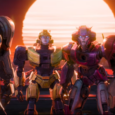Words by: Kiana Palacios
If there’s one thing that everyone can agree on, it’s that Metro Manila is not complete without the traffic. Drivers and non-drivers alike would at least have experienced the long wait during rush hour and all the blinking red lights that can be seen even from airplanes, a thousand miles high. But with all this traffic, more often than not, more and more people are pulled over. The question now is: what exactly are my rights when I do get pulled over?
ALSO READ: https://www.wheninmanila.com/mmda-be-wary-of-fake-traffic-enforcers/
We asked Atty. Christopher Sandico of Westwood Law Firm some questions about getting pulled over and compiled a little crash course of the things you should know if and when it happens to you. (Hopefully never, but rather safe than sorry!)
When can you get pulled over?
While most of the national roads in Metro Manila are filled with CCTV cameras and are covered by a No-Contact Policy (especially for minor violations), you can still get pulled over for over speeding, obstructions, and counterflows, the usual basic traffic violations.
Who can ask you to pull over?
Only fully uniformed officers who have recognizable nameplates can pull you over. These are officers who are usually from the Land and Transportation Office (LTO), Metropolitan Manila Development Authority (MMDA), and the Local Government Units (LGUs).
What should you do when you get pulled over?
When you do get pulled over, you should be asked to do so where there would be the least obstruction to the flow of traffic. It should also be in a well-lit place and must be open to the public view. Once pulled over, always keep in mind to be polite and respectful at all times. Make sure you open your car light when this occurs at night, always show your hands, and don’t make any sudden movements or take out something that might be interpreted as a weapon by the officer inspecting your car.
It is a rule for you and your passengers to stay in the car and you cannot be told to leave the car under any circumstance of inspection. This includes opening and unlocking the doors of your car, or opening the glove compartment and trunks. However, during a traffic accident, the officer may ask for the driver to get down the vehicle but not the passengers. They then are compelled to take a sobriety test.
Make sure to ask the officer politely for all the traffic violations you have committed before showing them your license and/or the car’s OR/CR. These are the only two things an officer can ask of you when being pulled over.
If and when you will be using videos, politely inform the officer you will be doing so, or that you will be making a call. Never call and drive at the same time.
Speaking of licenses, who can take your license?
The following can take your license given the following circumstances:
Fully deputized officers from the LTO – if with the proper mission order which includes their area of responsibility, time of duty, and official function.
Fully deputized officers of the LGUs – if they have the city ordinances granting them authority, usually includes most of Metro Manila, with the proper mission order
MMDA officers – even with the proper mission order, they CANNOT confiscate your license unless the driver was involved in a traffic accident, the driver has accumulated 3 or more unsettled traffic violations, or the driver has been apprehended for the following: allowing another person to use his/her drivers license, driving against traffic, illegal transfer of plate, tags, stickers, no driver’s ID, over-speeding, illegal counterflow, and using the motor vehicle in commission of a crime.
Are people allowed to search my car?
Only a properly deputized officer can do a visual search of your vehicle. This means they can only shine a light inside the car and look from outside, they cannot ask you to leave your vehicle and open windows or compartments inside the car for the entirety of the search and process of being pulled over.
In case of an emergency, can I ignore a signal to pull over?
In times of emergency, yes you still need to pull over. However, what you can do is explain the emergency politely to the officer who pulled you over. If you’re lucky, sometimes, the officers might even escort you to make your travel time to your emergency quicker. If not, you might end up delaying your emergency by getting into more trouble with the officers. No matter the circumstance, you still need to obey traffic rules.
Hopefully, this speeds up the process and helps you get out of unnecessary trouble in the future!
Got any other questions you need answered? Let us know and we’ll try to get to them!




